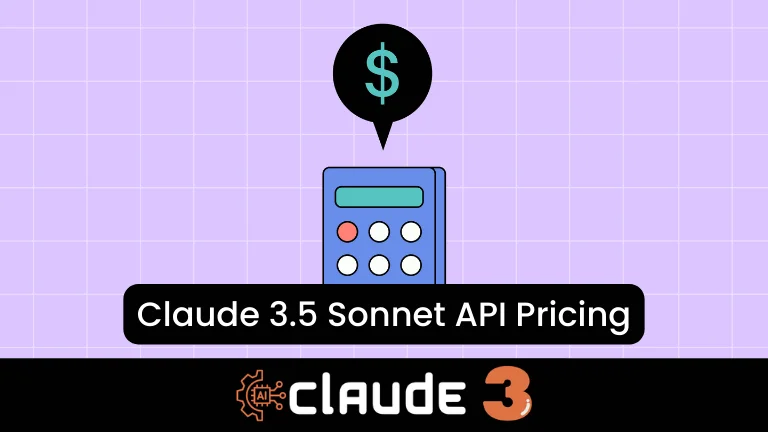Claude 3.5 Sonnet API Pricing. As businesses and developers seek to harness its capabilities, understanding the pricing structure for the Claude 3.5 Sonnet API is crucial. This comprehensive guide will delve into the intricacies of Claude 3.5 Sonnet API pricing, helping you make informed decisions about integrating this powerful AI tool into your projects.
What is Claude 3.5 Sonnet?
Before we dive into the pricing details, let’s briefly explore what makes Claude 3.5 Sonnet special. As part of the Claude 3 model family developed by Anthropic, Claude 3.5 Sonnet represents the pinnacle of AI language processing. It combines advanced natural language understanding with the ability to perform complex tasks, making it an invaluable asset for a wide range of applications.
The Claude 3.5 Sonnet Advantage
Claude 3.5 Sonnet offers several key advantages that set it apart from other AI models:
- Enhanced language understanding
- Improved context retention
- Advanced reasoning capabilities
- Versatility across various tasks
- Ethical AI design
These features make Claude 3.5 Sonnet an attractive option for businesses looking to leverage cutting-edge AI technology. But how does this translate into pricing?
Understanding Claude 3.5 Sonnet API Pricing
Pricing for the Claude 3.5 Sonnet API is designed to be flexible and scalable, accommodating the needs of various users, from individual developers to large enterprises. The pricing model is based on several factors, which we’ll explore in detail.
Usage-Based Pricing
At its core, Claude 3.5 Sonnet API pricing follows a usage-based model. This means you only pay for what you use, making it cost-effective for projects of all sizes. Usage is typically measured in tokens, which are the basic units of text processing for the API.
Token-Based Calculation
Tokens are the foundation of Claude 3.5 Sonnet’s pricing structure. A token can be as short as a single character or as long as a word, depending on the language and context. Understanding how tokens are calculated is crucial for estimating your costs accurately.
Input vs. Output Tokens
The API distinguishes between input tokens (the text you send to the model) and output tokens (the text generated by the model). Pricing may vary between these two types of tokens, so it’s important to consider both when budgeting for your project.
Pricing Tiers
Claude 3.5 Sonnet API offers different pricing tiers to cater to various usage levels and requirements. Let’s break down these tiers:
Starter Tier
The Starter tier is perfect for individuals and small teams just beginning their journey with AI integration. It offers:
- A modest monthly token allocation
- Pay-as-you-go pricing for additional usage
- Basic support options
This tier allows you to experiment with the API and scale up as needed without a significant upfront investment.
Professional Tier
For businesses with more substantial AI needs, the Professional tier provides:
- A larger monthly token allocation
- Discounted rates for additional usage
- Enhanced support options
- Access to additional features
This tier is ideal for companies looking to integrate Claude 3.5 Sonnet deeply into their products or services.
Enterprise Tier
Large organizations with extensive AI requirements will find the Enterprise tier most suitable. It offers:
- Custom token allocations
- Volume-based discounts
- Dedicated support and account management
- Advanced features and integrations
- Service Level Agreements (SLAs)
The Enterprise tier provides the flexibility and support needed for mission-critical AI applications.
Factors Affecting Pricing
Several factors can influence the overall cost of using the Claude 3.5 Sonnet API:
Volume of Usage
As with many services, higher usage volumes often lead to better rates. Businesses that commit to larger token allocations may benefit from volume discounts.
Complexity of Tasks
More complex tasks may require more tokens to process, potentially increasing costs. However, Claude 3.5 Sonnet’s efficiency often results in fewer tokens needed compared to other models.
API Call Frequency
The frequency of API calls can impact pricing, especially for real-time applications. Some pricing plans may offer optimizations for high-frequency usage.
Data Privacy and Security Requirements
Enhanced data privacy and security features, such as dedicated instances or custom data handling processes, may affect pricing.
Cost Optimization Strategies
To make the most of your investment in Claude 3.5 Sonnet API, consider these cost optimization strategies:
Efficient Prompt Engineering
Well-crafted prompts can significantly reduce the number of tokens required for a task. Invest time in optimizing your prompts for efficiency.
Caching and Storage
Implement caching mechanisms to store frequently requested information, reducing the need for repeated API calls.
Batch Processing
Where possible, batch similar requests together to minimize the number of API calls and potentially benefit from bulk processing efficiencies.
Regular Usage Analysis
Continuously monitor your API usage to identify patterns and opportunities for optimization. This can help you choose the most cost-effective pricing tier.
Comparing Claude 3.5 Sonnet API Pricing
To put Claude 3.5 Sonnet’s pricing into perspective, it’s helpful to compare it with other AI language models on the market. While specific pricing details may vary, Claude 3.5 Sonnet often offers competitive rates, especially when considering its advanced capabilities.
Value Proposition
When evaluating Claude 3.5 Sonnet’s pricing, consider the value it provides:
- Superior language understanding
- Reduced need for fine-tuning
- Faster development cycles
- Potential for more accurate and reliable outputs
These factors can contribute to overall cost savings and improved ROI for your AI projects.
Use Cases and Pricing Scenarios
To better understand how Claude 3.5 Sonnet API pricing applies in real-world situations, let’s explore some common use cases and their potential pricing implications:
Content Generation
For businesses using Claude 3.5 Sonnet to generate articles, product descriptions, or marketing copy, pricing will depend on the volume and length of content produced. A content marketing agency might find the Professional tier suitable, with the ability to scale up during peak periods.
Customer Support Chatbots
Companies implementing AI-powered chatbots for customer support may see varying costs based on the complexity of queries and the number of customer interactions. The Enterprise tier might be appropriate for large-scale deployments handling thousands of conversations daily.
Data Analysis and Reporting
Organizations using Claude 3.5 Sonnet for data analysis and report generation will need to consider the size and complexity of their datasets. The Professional or Enterprise tier could be suitable, depending on the frequency and depth of analysis required.
Language Translation Services
Translation services leveraging Claude 3.5 Sonnet’s multilingual capabilities will need to account for both input and output tokens across different languages. The pricing tier choice will depend on the volume and diversity of languages handled.
Code Generation and Analysis
Developers using the API for code generation or analysis should consider the complexity of their programming tasks. The Starter or Professional tier might suffice for smaller teams, while larger development organizations may benefit from the Enterprise tier.
Getting Started with Claude 3.5 Sonnet API
If you’re ready to explore Claude 3.5 Sonnet API pricing for your project, here are the steps to get started:
- Visit the official Anthropic website
- Sign up for an account or log in if you already have one
- Explore the available pricing tiers and features
- Consider requesting a demo or consultation for personalized pricing information
- Start with a small-scale project to assess your needs and usage patterns
- Scale up your usage as needed, adjusting your plan accordingly
The Future of AI Pricing
As AI technology continues to advance, pricing models are likely to evolve. Keep an eye out for:
- More granular pricing options
- Industry-specific pricing plans
- Bundle deals for multiple AI services
- Performance-based pricing models
Staying informed about these trends will help you make strategic decisions about your AI investments.
Maximizing ROI with Claude 3.5 Sonnet API
To ensure you’re getting the best return on your investment in Claude 3.5 Sonnet API, consider the following tips:
Align AI Usage with Business Goals
Clearly define how Claude 3.5 Sonnet will contribute to your business objectives. This alignment will help justify costs and measure success.
Invest in Training and Education
Ensure your team is well-versed in using the API effectively. This can lead to more efficient usage and better outcomes.
Leverage Community Resources
Tap into the Claude 3.5 Sonnet developer community for tips, best practices, and creative use cases that can help you maximize value.
Regularly Review and Adjust
Periodically assess your usage patterns and adjust your pricing tier or implementation strategy to optimize costs and benefits.
Conclusion: Making the Right Choice for Your AI Needs
Claude 3.5 Sonnet API pricing is designed to offer flexibility and scalability for businesses of all sizes. By understanding the pricing structure, considering your specific use cases, and implementing cost optimization strategies, you can harness the power of this advanced AI model while managing costs effectively.
As you explore the possibilities of Claude 3.5 Sonnet, remember that the true value lies not just in the pricing, but in the transformative potential it brings to your projects. Whether you’re a startup looking to innovate or an enterprise seeking to streamline operations, Claude 3.5 Sonnet offers a powerful toolset to drive your AI initiatives forward.
Take the time to thoroughly evaluate your needs, experiment with the API, and engage with the Anthropic team to find the perfect pricing solution for your organization. With the right approach, Claude 3.5 Sonnet can become a valuable asset in your AI arsenal, driving innovation, efficiency, and growth.

